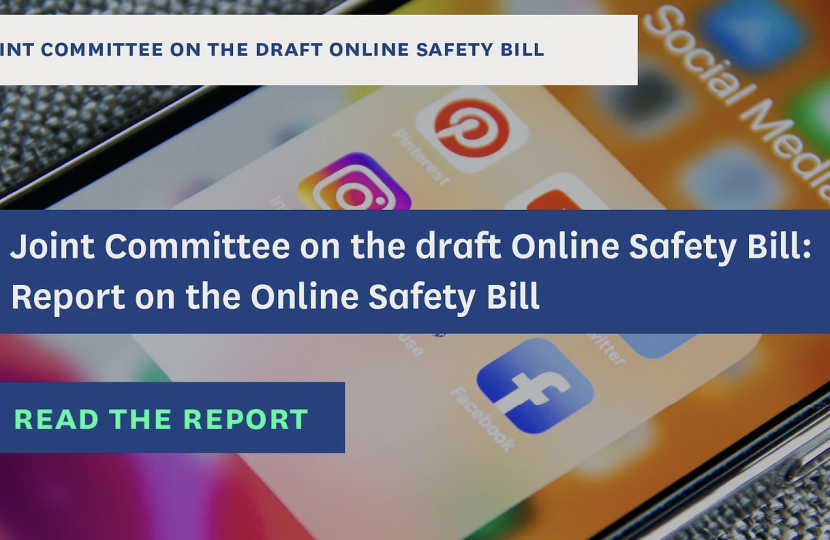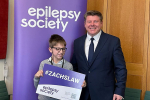
Local Watford MP Dean Russell welcomed the final report that has been published by the Joint Committee on the Draft Online Safety Bill, a committee he has been a member of since July 2021. The committee wanted to ensure that the aims were enshrined into law which would see tech platforms having a much stronger duty of care to protect all its users.
The Committee Report contains a raft of measures to ensure that the large tech companies, which include Twitter, Facebook and TikTok abide by the law in the UK.
This ground-breaking and critical bill will put the responsibility firmly on internet service providers for the content that is being shared on their platforms, including for serious crimes like child abuse, fraud, racist abuse, the promotion of self-harm, and violence against women, for which previously there was little enforceable sanction.
The first evidence session was held in September, when Dean Russell and other Committee Members heard from a wide cross section of witnesses. These include those who have been affected by online harm and include Rio Ferdinand, Martin Lewis and the father of Molly Russell. In addition to these witnesses, the committee also heard from senior officials who held roles with responsibility on social media platforms, and include the Head of Facebook Security Antigone Davis, the Senior Executive Director of Twitter Nick Pickles and the Facebook whistle-blowers Frances Haugen and Sophie Zhang.
Following the hearing of the testimonials, and considering hundreds of pages of written evidence, the committee concluded the following strong messages:
- Big tech has failed its chance to self-regulate. They must obey this new law and comply with Ofcom as the UK regular or face sanctions.
- Ofcom should set the standards by which big tech will be held accountable and their powers to investigate, audit and fine the companies should be increased.
- Service providers should be required to create an Online Safety Policy for users to agree with, similar to their terms and conditions of service.
- The new regulatory regime must contain robust protections for freedom of expression, including an automatic exemption for recognised news publishers, and acknowledge that journalism and public interest speech are fundamental to democracy.
In addition to these changes to the regulatory bodies that govern the actions of platforms online, the Bill has recommended that the following steps be taken:
- Cyberflashing be made illegal
- Deliberately sending flashing images to people with photosensitive epilepsy with the intention of inducing a seizure be made illegal (also known as Zach’s Law)
- Pornography sites will have legal duties to keep children off them regardless of whether they host user-to-user consent
Taken together, this Bill has been created with the intention to protect the public online, particularly the most vulnerable in our society. For too long it has been evident that big tech companies such as social media platforms have failed in their duty of care to protect their users, and this is why Dean Russell and the other members of this committee have recommended these important steps to the government with the aim of ensuring that the responsibility for tackling harmful behaviour is placed on the owners of the platform and not the user using their service.
Damian Collins MP, Chair of the Joint Committee on the Draft Online Safety Bill, said:
“The Committee were unanimous in their conclusion that we need to call time on the wild west online. What’s illegal offline should be regulated online. For too long, big tech has gotten away with being the land of the lawless. A lack of regulation online has left too many people vulnerable to abuse, fraud, violence and in some case even loss of life.
The Committee have set out recommendations to bring more offences clearly within the scope of the Online Safety Bill, give Ofcom the power in law to set minimum safety standards for the services they will regulate, and to take enforcement action against companies if they don’t comply.
The era of self-regulation for big tech has come to an end. The companies are clearly responsible for services they have designed and profit from and need to be held to account for the decisions they make.”
Dean Russell stated, "I am proud to have played a role, alongside committee members, on the Draft Online Safety Bill. This piece of work is truly ground-breaking and will help everyone who uses social media going forward. The recommendations are strong, powerful, and direct and will make social media companies responsible and accountable, particularly to the most vulnerable members of society whilst ensuring freedom of speech.
Following my questions to witnesses representing social media organisations I was very pleased that Nick Pickles, the Senior Executive Director of Twitter, followed through on his promise to meet myself, Suzanne Webb MP and Clare Pelham, the CEO of the Epilepsy Society to discuss practical steps to stop the malicious sending of flashing images to people with epilepsy which are designed to cause harmful seizures.
The committee have met on many of occasions since July, and I have probed the witnesses to ensure we have as much information as possible to consider before producing our final recommendations. This has included asking former England and Manchester United footballer Rio Ferdinand about the impact of racist abuse he has received online, Martin Lewis about the impact of financial scams of his hard-fought reputation of being a reliable source of information, through to Frances Haugen, the Facebook whistle-blower who made headlines recently around the world with her testimony about her experience working for the platform.”




